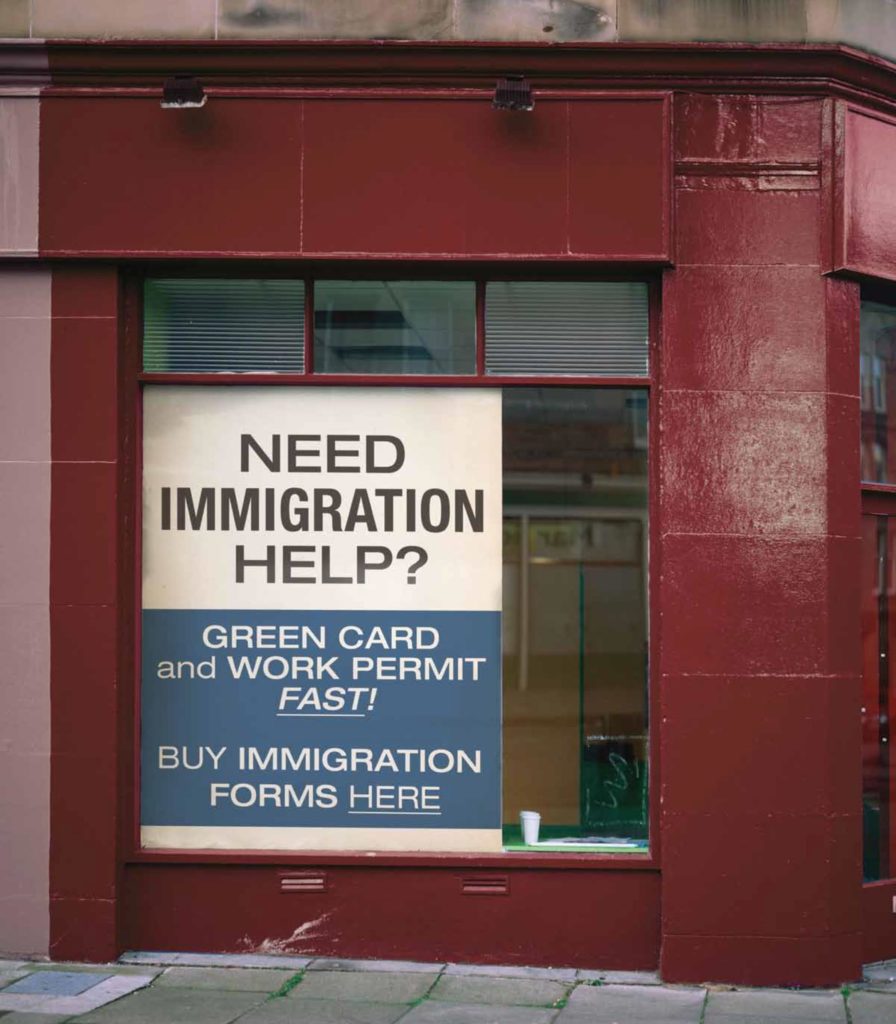If there ever were a person susceptible to abuse, it’s the undocumented immigrant. And if there ever were conditions leading to scams, they’re unfolding right now.
The Land of Opportunity Fund was born for many reasons, not the least of which was fraud. Hucksters—a presence in any immigrant-heavy neighborhood—are swindling unsuspecting and desperate workers out of their savings, filing false asylum claims, and in some cases even tempting foreigners to come to the United States on travel visas and never go back.
The complexity of the U.S. immigration system, lack of information, desperation, fear and mistrust of authorities (including attorneys) breed the crimes. (Read our story, Potential in the Shadows: The Immigration Dilemma in Southwest Florida, here.)
“Because of the way our system is set up, there is no line you can just get in to legalize,” says Lindsay Ray, an immigration lawyer at the Amigos Center in Bonita Springs. She and other attorneys will be candid with those who fit no category. But out in the community, scam artists (usually fellow immigrants) bombard them with false promises. “They’ll say, ‘Oh, don’t you know about this 10-year law? Just sign this piece of paper, and you’ll get a work card.’”
There is no such provision. If there were, some 7 million undocumented immigrants would be holding green cards. That’s how many unauthorized people have been here a decade or longer, according to Pew Research Center estimates.
Immigration advocates and area philanthropists hope the Land of Opportunity initiative deters fraud by increasing immigrants’ access to pro-bono attorneys and by arming them with an app to navigate the immigration system.
Fraud is frequently perpetrated by Spanish-speaking business owners who call themselves “notarios.” The term roughly translates to “notary public,” which English speakers understand as a certified clerk. In many Spanish-speaking nations, however, a “notario” is a highly trained legal professional. Even though laws now exist requiring signage to read “notary public” and not “notario,” there’s no way to enforce what business owners verbally call themselves or to crack down on other deceptive terms.
 The most common version of notario fraud involves asylum applications, Ray explains. These petitions come with an unusual perk—a work card that’s issued while the case is pending, a period that could last a decade or more. But when the hearing finally comes around, the asylum-seeker realizes that the burden of proof is high and requires meticulous documentation.
The most common version of notario fraud involves asylum applications, Ray explains. These petitions come with an unusual perk—a work card that’s issued while the case is pending, a period that could last a decade or more. But when the hearing finally comes around, the asylum-seeker realizes that the burden of proof is high and requires meticulous documentation.
“Asylum is so difficult to prove. You have to prove persecution in the entire country and you have to have something to back it up—it can’t just be oral threats,” she says. If the judge rules against the applicant, deportation proceedings begin.
Such fraud is not limited to the Hispanic community. Ksenia Maiorova, who runs an immigration law practice in Orlando and is active in the American Immigration Lawyers Association, says it is rampant among Asians and Russians as well. A native of Russia, Maiorova once found a video circulating on YouTube filmed by a Russian “notary” (the Russian term “notarius” also conveys a highly trained legal professional) and targeted to Russians still living at home. In it, the man (who looks like he’s sitting somewhere in Florida), tells would-be immigrants to get a visitor’s visa and then see him for help with an asylum claim.
“That’s fraud,” Maiorova says of the visa application.
She’s also seen scammers arrange fake marriages, produce fraudulent documents and prepare paperwork that they are not legally authorized to handle.
“I am accountable to the law. If I misrepresent my clients, I can lose my license,” Maiorova says. “They’ve gotten so egregious because the enforcement is nonexistent.”
To go after someone for unlicensed practice of law, the victim has to file a complaint with authorities—an unlikely step for someone in the country unlawfully.
In places like Immokalee, the fraud is blatant; immigration attorney Maureen Kelleher once confronted a woman going door-to-door posing as an immigration officer and then offering to handle residency applications. Local law enforcement told Kelleher it was a federal crime, out of their jurisdiction.
Along Main Street and State Road 29 in that community are at least three storefronts that advertise “immigration services.” But the only people legally sanctioned to handle immigration matters are attorneys and Department of Justice-authorized providers, who undergo training and certification. These providers, moreover, must work at qualifying nonprofit organizations such as Catholic Charities, Lutheran Services and Redlands Migrant Christian Association in Southwest Florida. Others who dabble in immigration could be violating the state’s unlicensed practice of law statutes—a third-degree felony.
“There’s a lot of work, and people need protections,” says Lucille Acken, who directs immigration services for Catholic Charities through the Diocese of Venice. “I’ve gotten three or four calls just this morning and one call yesterday.”
Among them was a query from an employer who was worried about an employee’s about-to-expire visa. Acken told the caller: Whatever you do, don’t let her go to a notario.
The notarios and their ilk, however, aren’t the only perpetrators of fraud. At RCMA, Kristina O’Hern, who is certified to work on immigration cases, has seen cases in which fly-by-night attorneys set up shop, charge excessive fees, perform lackluster services and leave town.
“They might be barred and in good standing, but they are unethical,” she says. “We want to send a message that we don’t tolerate that. It’s not OK.”
She’s working with immigrants such as Patricia, a legal resident, to help the community understand who’s authorized to provide services and what to look for in choosing legal counsel. (Gulfshore Life is not fully identifying Patricia because her husband does not have legal status.)
“They’ll say, ‘You have a child here, you can have legal status.’ That’s not how it works. … There is no way to get your residence or your work permit from your kids,” Patricia says.
In a growing climate of fear, O’Hern says, even taxi drivers are getting in on the scams, offering to help fill out legal paperwork that can be resolved only at consulates in Miami, a trip for which they’ll need a licensed driver.
“We want our families to have the correct information and know the signs of fraud,” O’Hern says. “People are so desperate. They want to believe.”
To learn more or to report fraud, click here.





